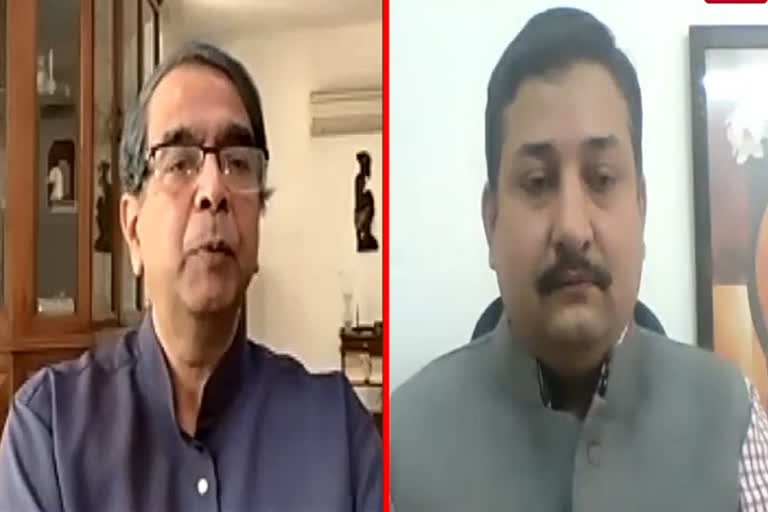New Delhi:Indians must strictly follow the time tested public health measures like wearing masks, hand washing and social distancing and stop super spreader events like weddings and other large gatherings to start the next year without the fear of the Covid-19 virus as vaccines alone will not be effective against it, said a noted public health expert.
In an exclusive interaction with ETV Bharat, Dr K Srinath Reddy, a noted public health expert and President of Public Health Foundation of India, said the success in the country’s fight against the deadly second Covid wave largely depends on following the time tested public health measures, which are effective against any new variants as well.
"Don't depend only on vaccination. If you depend on vaccination but allow super spreader events and people go around without a mask then you are not going to get out of the trouble for a year," Dr Reddy told ETV Bharat.
READ: CWC meet: Ex-PM Manmohan to send suggestions to PM Modi on COVID management
“We should start 2022, the year of the 75th anniversary of our independence without the fear of the virus. That is only possible when we are disciplined in 2021 with both our public health measures and our vaccination drive,” explained Dr Reddy.
“Let us keep that discipline while we are increasing our pace of vaccination. How many people we vaccinate depends upon the availability of vaccines. I believe that everybody above 35 will be preferably vaccinated by August 15,” he said.
What led to the second wave!
Talking about the onset of the second Covid wave, which gripped the nation in recent weeks and overwhelmed the medical infrastructure, Dr Reddy said it was a mistake to believe that the country had won the war against Covid at the start of this year when case count was low.
“We became too relaxed from early January when the numbers came down markedly, both in terms of daily case count and death count as well as the test positivity rate. We sort of assumed that we have seen the end of the pandemic,” said Dr Reddy.
He said this belief gained currency as some people talked about achieving heard immunity believing that Indians had some inherent genetic protection against the deadly virus.
Lockdown contained first wave
Dr Reddy says in the first wave, the cases had come down due to several steps, which included a long lockdown, several stages of unlocking with travel restrictions.
“Even during Diwali, large crowds were not there. That discipline disappeared the moment we declared the victory prematurely,” he told ETV Bharat.
“People thought they could celebrate large wedding gatherings, birthday parties, assembly and local body elections. Both domestic and international travel became frequent. And then came the new variants.”
UK delayed disclosure of new variant
Dr Reddy blamed the UK government for delaying the disclosure of a new variant to the rest of the world by several months.
"UK variant was known to them in September but it was declared to the world in December. Thereafter we set up the India consortium for genome sequencing in January and started looking for it. It was found in substantial numbers so it will not be proper to blame the travel policy," he said.
Faster transmission
Dr Reddy explained that the UK variant of Covid-19 virus is 60% faster in terms of infectivity rate as it has spike protein mutations.
“These proteins are the tools through which a virus opens the door to a human cell. There is a receptor called S2 receptor, the spike protein attaches itself to the receptor and then it twists the handle like a door and opens the door to the cell. Then it goes inside the cell, takes over the genetic machinery of the cell and starts multiplying and creating its own forms,” Dr Reddy explained.
“This particular mutant, and other mutants are using new spike protein mutations to more effectively stick to the receptor binding sites so that they cannot be easily dislodged or it can more easily open the cell so that it can get in. Their infectivity rate is much more because of that characteristic, not so much because they can travel faster,” he explained.
Lack of proper sampling
Talking about the importance of taking proper samples, Dr Reddy explained that even the RT-PCR test has only 60-70% test positivity rate in terms of sensitivity in identifying the virus when it is done in very good laboratory conditions.
“The swab collection is very important. What you are really looking for in a test is how the virus is replicating in the lab. If the swab is not transported properly or stored properly in the lab, a lot of mistakes can be made there and then you get a false negative result. That's why you need to repeat RT-PCR twice or thrice,” Dr Reddy explained.
Surface transmission!
